How to eliminate ads displayed by wholehugewords.com?
Notification SpamAlso Known As: Ads by wholehugewords.com
Get free scan and check if your device is infected.
Remove it nowTo use full-featured product, you have to purchase a license for Combo Cleaner. Seven days free trial available. Combo Cleaner is owned and operated by RCS LT, the parent company of PCRisk.com.
What page is wholehugewords[.]com?
Wholehugewords[.]com is designed to promote (open) untrustworthy pages and ask for permission to show notifications. There are lots of other pages of this type, for example, naijawide[.]com, news-hoyisa[.]cc, and stream-best-vid[.]com. Users do not open such pages on purpose.
![wholehugewords[.]com pop-up redirects](/images/stories/screenshots202110/wholehugewords-com-ads-main.jpg)
Wholehugewords[.]com website in detail
Wholehugewords[.]com displays a message asking to click the "Allow" button to subscribe to its notifications and continue loading the page. If allowed, wholehugewords[.]com shows notifications promoting various scams, questionable applications (possibly some browser hijackers, adware).
Also, wholehugewords[.]com opens questionable websites. It could open download pages for potentially unwanted applications (PUAs), pages asking to provide credit card details, bank account numbers or other personal information, and so on. Thus, wholehugewords[.]com should not be visited and allowed to show notifications.
| Name | Ads by wholehugewords.com |
| Threat Type | Push notifications ads, Unwanted ads, Pop-up ads |
| Detection Names | N/A (VirusTotal) |
| Symptoms | Seeing advertisements not originating from the sites you are browsing. Intrusive pop-up ads. Decreased Internet browsing speed. |
| Distribution Methods | Deceptive pop-up ads, potentially unwanted applications (adware) |
| Damage | Decreased computer performance, browser tracking - privacy issues, possible additional malware infections. |
| Malware Removal (Windows) |
To eliminate possible malware infections, scan your computer with legitimate antivirus software. Our security researchers recommend using Combo Cleaner. Download Combo CleanerTo use full-featured product, you have to purchase a license for Combo Cleaner. 7 days free trial available. Combo Cleaner is owned and operated by RCS LT, the parent company of PCRisk.com. |
Wholehugewords[.]com in general
Wholehugewords[.]com and similar sites ask for permission to show notifications and promote dubious sites. Most of them use clickbait techniques to trick visitors into agreeing to receive their notifications. Usually, these pages are promoted via shady ads, questionable sites, or PUAs.
How did adware install on my computer?
A popular way to distribute PUAs is to bundle them with other programs. They can be found included in downloaders and installers as optional downloads or installations. Users can deselect PUAs in "Custom", "Advanced", "Manual", or other settings. They download or install PUAs when they leave those settings unchanged.
Sometimes, users cause unexpected installations or downloads by clicking deceptive advertisements designed to execute certain scripts. Also, they can cause it through fake installers downloaded from deceptive (or questionable in other ways) websites.
How to avoid installation of potentially unwanted applications?
Applications and files should be downloaded from legitimate, official websites and via direct links. Downloads and installations should not be finished without checking downloaders and installers for "Custom", "Advanced", "Manual" or other settings, or ticked checkboxes. Advertisements appearing on untrustworthy websites should not be clicked as well.
If your computer is already infected with rogue applications, we recommend running a scan with Combo Cleaner Antivirus for Windows to automatically eliminate them.
Appearance of wholehugewords[.]com website (GIF):
![wholehugewords[.]com website appearance (GIF)](/images/stories/screenshots202110/wholehugewords-com-ads-appearance.gif)
Notifications from wholehugewords[.]com website:
Instant automatic malware removal:
Manual threat removal might be a lengthy and complicated process that requires advanced IT skills. Combo Cleaner is a professional automatic malware removal tool that is recommended to get rid of malware. Download it by clicking the button below:
DOWNLOAD Combo CleanerBy downloading any software listed on this website you agree to our Privacy Policy and Terms of Use. To use full-featured product, you have to purchase a license for Combo Cleaner. 7 days free trial available. Combo Cleaner is owned and operated by RCS LT, the parent company of PCRisk.com.
Quick menu:
- What is Ads by wholehugewords.com?
- STEP 1. Remove spam notifications from Google Chrome
- STEP 2. Remove spam notifications from Google Chrome (Android)
- STEP 3. Remove spam notifications from Mozilla Firefox
- STEP 4. Remove spam notifications from Microsoft Edge
- STEP 5. Remove spam notifications from Safari (macOS)
Disable unwanted browser notifications:
Video showing how to disable web browser notifications:
 Remove spam notifications from Google Chrome:
Remove spam notifications from Google Chrome:
Click the Menu button (three dots) on the right upper corner of the screen and select "Settings". In the opened window select "Privacy and security", then click on "Site Settings" and choose "Notifications".
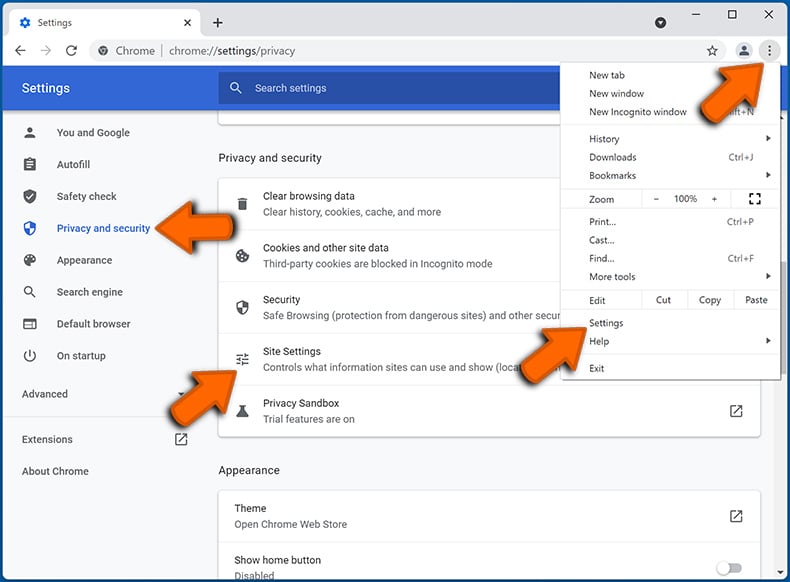
In the "Allowed to send notifications" list search for websites that you want to stop receiving notifications from. Click on the three dots icon near the website URL and click "Block" or "Remove" (if you click "Remove" and visit the malicious site once more, it will ask to enable notifications again).
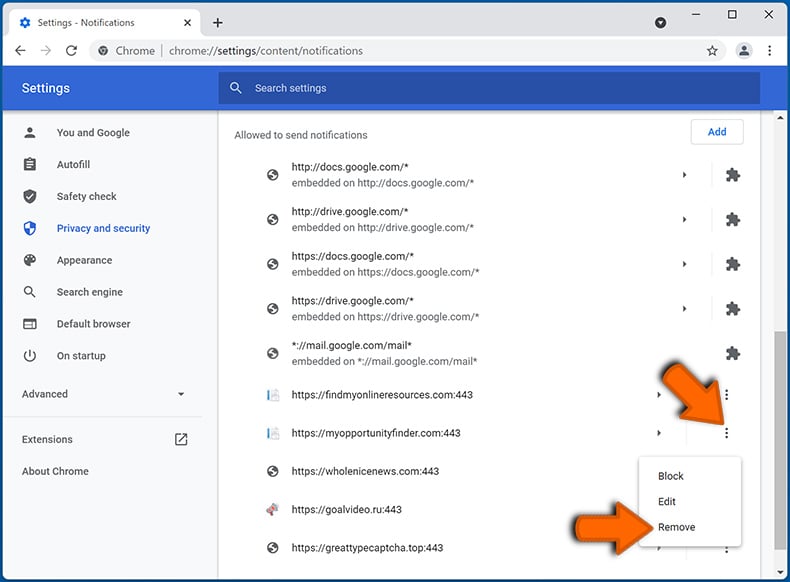
 Remove spam notifications from Google Chrome (Android):
Remove spam notifications from Google Chrome (Android):
Tap the Menu button (three dots) on the right upper corner of the screen and select "Settings". Scroll down, tap on "Site settings" and then "Notifications".
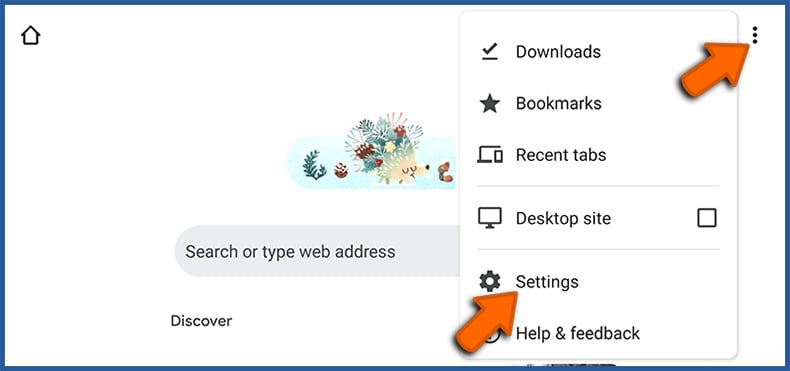
In the opened window, locate all suspicious URLs and tap on them one-by-one. Once the pop-up shows up, select either "Block" or "Remove" (if you tap "Remove" and visit the malicious site once more, it will ask to enable notifications again).
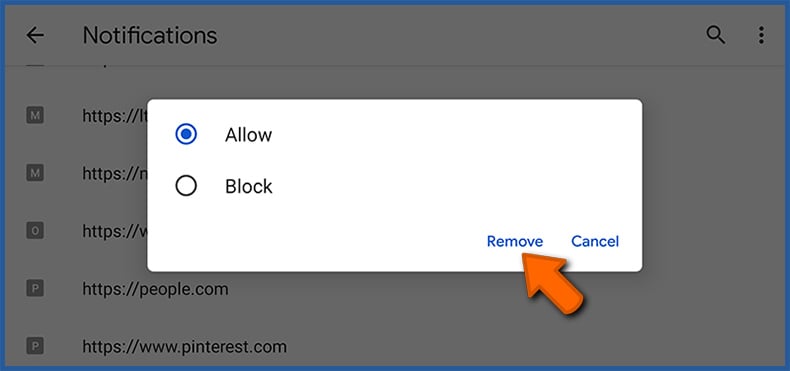
 Remove spam notifications from Mozilla Firefox:
Remove spam notifications from Mozilla Firefox:
Click the Menu button (three bars) on the right upper corner of the screen. Select "Settings" and click on "Privacy & Security" in the toolbar on the left hand side of the screen. Scroll down to the "Permissions" section and click the "Settings" button next to "Notifications".
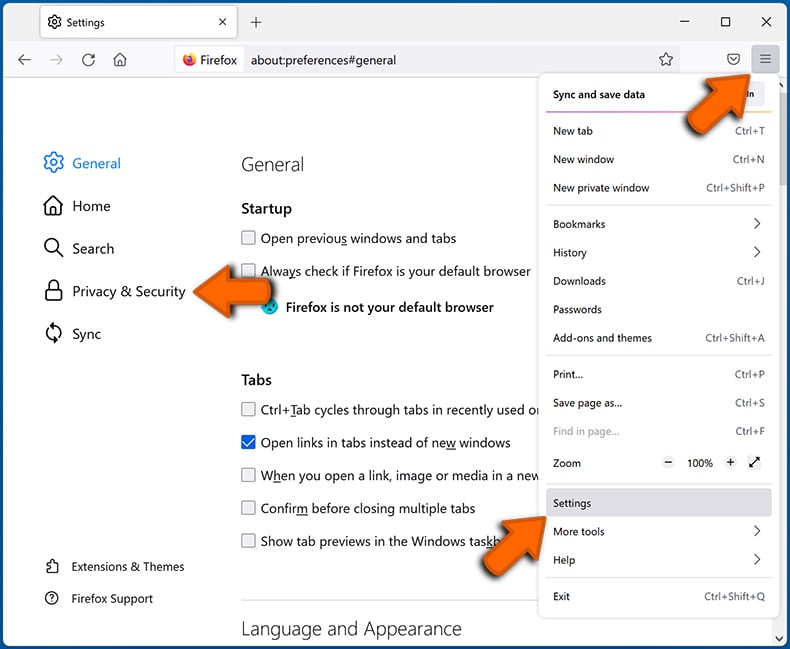
In the opened window, locate all suspicious URLs and block them using the drop-down menu or either remove them by clicking "Remove Website" at the bottom of the window (if you click "Remove Website" and visit the malicious site once more, it will ask to enable notifications again).
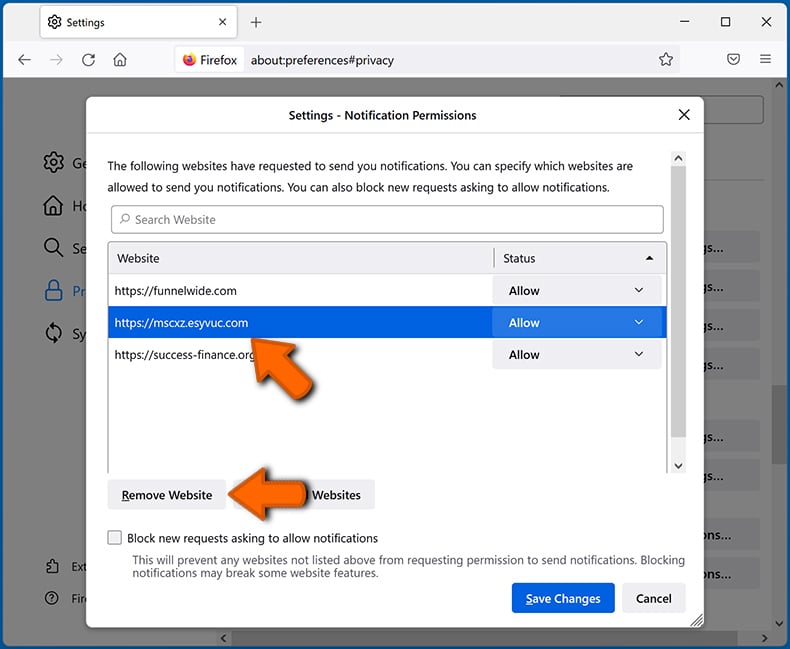
 Remove spam notifications from Microsoft Edge:
Remove spam notifications from Microsoft Edge:
Click the menu button (three dots) on the right upper corner of the Edge window and select "Settings". Click on "Cookies and site permissions" in the toolbar on the left hand side of the screen and select "Notifications".
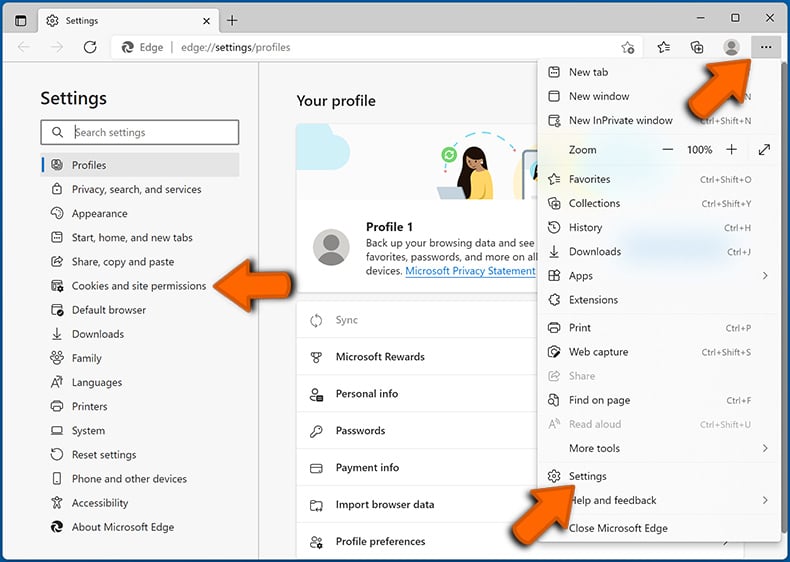
Click three dots on the right hand side of each suspicious URL under "Allow" section and click "Block" or "Remove" (if you click "Remove" and visit the malicious site once more, it will ask to enable notifications again).
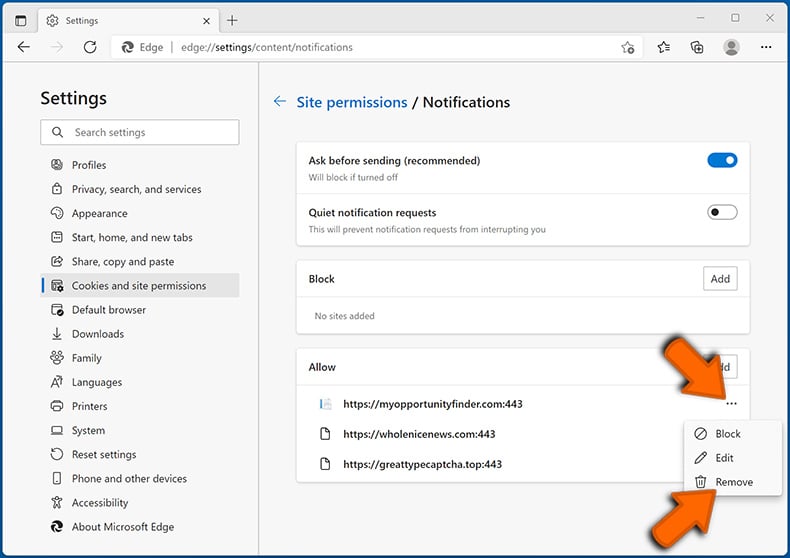
 Remove spam notifications from Safari (macOS):
Remove spam notifications from Safari (macOS):
Click "Safari" button on the left upper corner of the screen and select "Preferences...". Select the "Websites" tab and then select "Notifications" section on the left pane.
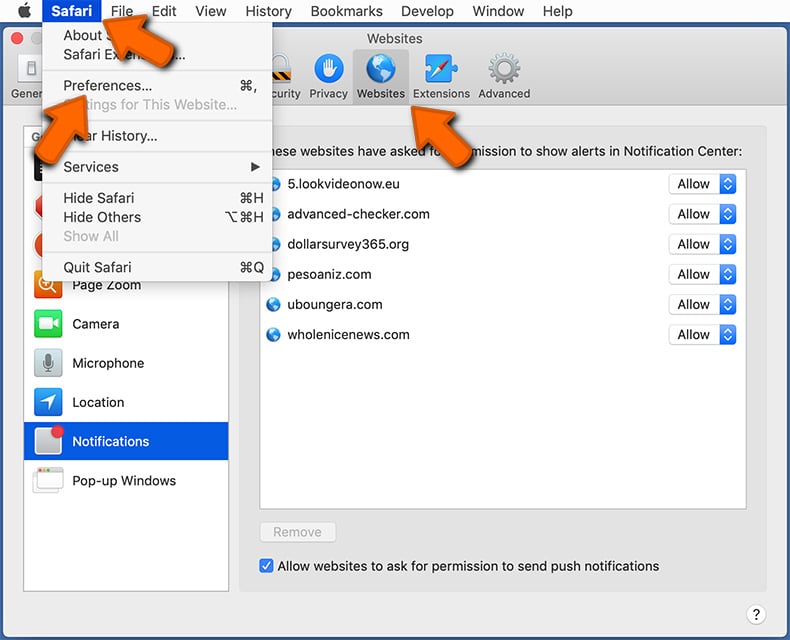
Check for suspicious URLs and apply the "Deny" option using the drop-down menu or either remove them by clicking "Remove" at the bottom of the window (if you click "Remove" and visit the malicious site once more, it will ask to enable notifications again)
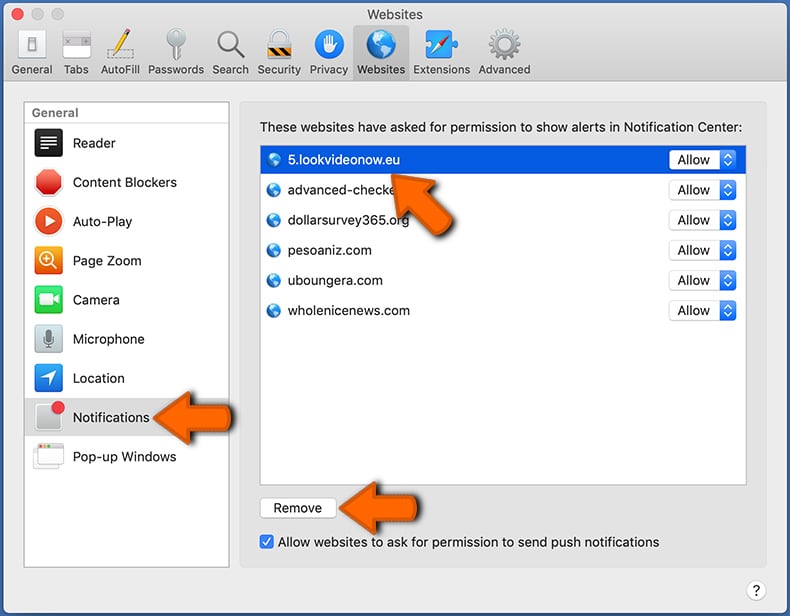
How to avoid browser notification spam?
Internet users should be very skeptical when being asked to allow notifications. While this is a useful feature that allows you to receive timely news from websites you like, deceptive marketers frequently abuse it.
Only allow notifications from websites that you fully trust. For added security - use an anti-malware application with a real-time web browsing monitor to block shady websites that tries to trick you into allowing spam notifications. We recommend using Combo Cleaner Antivirus for Windows.
Frequently Asked Questions (FAQ)
Why am I seeing ads (browser notifications) delivered by wholehugewords[.]com in the right lower corner of my desktop?
Websites deliver notifications only when they have permission for that. It means that wholehugewords[.]com has been allowed to show notifications.
I have clicked on notification ads, is my computer infected?
It is harmless to click on notifications displayed by pages like wholehugewords[.]com. However, those notifications can be designed to open malicious websites.
Is wholehugewords[.]com a virus?
This site is used as a tool to promote various scams, other dubious pages, potentially malicious applications, and so on. Pages like wholehugewords[.]com are not considered to be viruses.
Will Combo Cleaner remove wholehugewords[.]com ads automatically or manual steps are still required?
Yes, Combo Cleaner will scan your computer and eliminate all the permissions that wholehugewords[.]com has. It will also block all further access to this page. No additional steps will be required.
Share:

Tomas Meskauskas
Expert security researcher, professional malware analyst
I am passionate about computer security and technology. I have an experience of over 10 years working in various companies related to computer technical issue solving and Internet security. I have been working as an author and editor for pcrisk.com since 2010. Follow me on Twitter and LinkedIn to stay informed about the latest online security threats.
PCrisk security portal is brought by a company RCS LT.
Joined forces of security researchers help educate computer users about the latest online security threats. More information about the company RCS LT.
Our malware removal guides are free. However, if you want to support us you can send us a donation.
DonatePCrisk security portal is brought by a company RCS LT.
Joined forces of security researchers help educate computer users about the latest online security threats. More information about the company RCS LT.
Our malware removal guides are free. However, if you want to support us you can send us a donation.
Donate

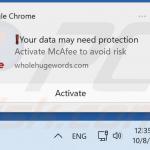
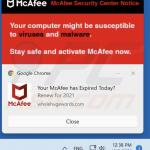
▼ Show Discussion